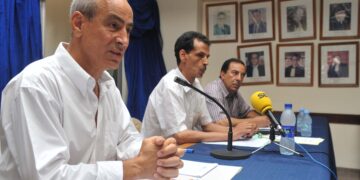Israel's Bank Haopoalim, GiveChak, are evading US sanctions for the second time in recent weeks, violating Biden Executive Order on West Bank Extremism.
(Washington D.C., March 22, 2024) — The U.S. Departments of Treasury and State should impose sanctions on Israeli Bank Hapoalim's Bit subsidiary, crowdsourcing website GiveChak, credit card processor Nedarim-Plus, and Israeli charity "Chiburim – Beit She'an and the Valley" for violating President Biden's Executive Order 14115 prohibiting funding, goods or services to sanctioned Israeli settlers and settlements. Two of the companies, Bank Hapoalim and GiveChak, previously violated sanctions rules by providing services to other Israeli settlers.
A full list of the organizations violating the Executive Order can be found below.
"Without meaningful enforcement against companies evading Biden's Executive Order, violent Israeli settlers are wearing the President's designation as a badge of pride and even using it as a fundraising strategy," said Michael Schaeffer Omer-Man, director of research for Israel-Palestine at DAWN. "Until there is a cost for Israeli financial institutions providing material support to designated settlers, these sanctions will not deter their ongoing violence against Palestinians."
On February 1, 2024, President Biden issued an Executive Order "Imposing Certain Sanctions on Persons Undermining Peace, Security, and Stability in the West Bank," which declared extremism and violence by Israeli settlers in the West Bank a threat to US national security interests and foreign policy. The executive order defines a range of activities, including providing funding, goods or services to designated individuals, that can result in an individual or entity being added to the Specially Designated Nationals and Blocked Persons List (SDN). On March 14, the Department of State designated three additional extremist and violent Israeli settlers and two settlement outposts — Zvi Bar Yosef and his settlement outpost, Zvi's Farm, Moshe Sharvit and his settlement outpost, Moshe's Farm (aka Emek Tirza Farm), and Neriya Ben Pazi — to the SDN pursuant to the February 1 Executive Order.
Section 3 of the Executive Order prohibits "the making of any contribution or provision of funds, goods, or services by, to, or for the benefit of any person whose property and interests in property are blocked pursuant to this order," including receiving funds, goods or services on behalf of the sanctioned person. The White House can add a person or entity violating sanctions designations to the list, freeze or seize its assets, or subject it to other administrative, criminal, or financial measures. Because the United States banking system is so ubiquitous that it touches many types of transactions and movement of money globally, global entities, banks, payment processors, and websites will need to comply with the Executive Order or otherwise face sanctions that will disrupt their own ability to conduct business.
"If settler violence does indeed pose 'an unusual and extraordinary threat' to US national security, as President Biden stated in his executive order, he should sanction the entire ecosystem that supports, protects, and brazenly funds it," said Sarah Leah Whitson, Executive Director of DAWN. "Ultimately, the Biden administration will be forced to recognize that the Israeli government itself is aiding and abetting lawless settlers and settlements terrorizing Palestinians."
In imposing the sanctions, President Biden described how "the situation in the West Bank — in particular high levels of extremist settler violence, forced displacement of people and villages, and property destruction — has reached intolerable levels.״ The executive order followed the failure of the Israeli government and police's refusal to curb violent Israeli settlers in the West Bank, particularly in the past year under the aegis of Israeli National Security Minister Itamar Ben Gvir. Ben Gvir reportedly instructed police to stop law enforcement activities against settlers in recent months. The executive order explicitly includes as a sanctionable activity "failing to enforce policies that threaten the peace, security, or stability of the West Bank."
Sanctions Evasion
As detailed below, a number of Israeli banks, financial institutions, and private companies have repeatedly violated the Executive Order by providing goods and services for the benefit of sanctioned persons. Following the first round of sanctions , DAWN documented how Israel's Bank Hapoalim, crowdfunding website GiveChak.co.il, two credit card processors, Meshulam and PeleCard, and a non-profit organization were raising money for the benefit of one sanctioned settler, Yinon Levi, in defiance of the Executive Order. Following DAWN's report and news coverage, GiveChak shut down Levi's fundraising campaign, and the two Israeli credit card companies froze the funds collected for Levi.
Many of those same institutions are now again violating the Executive Order by providing services to at least one individual and one entity designated on March 14 — Moshe Sharvit, and his settlement outpost, Moshe's Farm. The State Department has stated that Sharvit uses the outpost "as a base from which he perpetrates violence against Palestinians."
GiveChak.co.il, the same website that hosted — and subsequently deleted — a crowdfunding campaign to evade sanctions against Levi, is now hosting a crowdfunding campaign for the benefit of Sharvit and his outpost. As of March 20, 2024, the campaign had raised over 3.2 million Israeli shekels (roughly $900,000). The campaign states that it intends to build a new structure on the outpost that will serve as an educational center for instilling Israeli soldiers and youth with the values of the farm, and those of its co-founder, Moshe Sharvit's late brother, who was killed in combat in the Gaza Strip.
GiveChak is now using Nedarim-Plus, a credit card processing company that is owned by a private Israeli company, Matara Hafakot Inc.. ]. The two other credit card processors, Meshulam and PeleCard, implicated by DAWN in a previous sanctions evasion crowdfunding effort, reportedly froze the funds they had facilitated for Levi. As of March 20, Meshulam was still accepting donations for a campaign to benefit illegal construction near a different Israeli settlement, Tel Menashe, albeit one that has not yet been designated.
GiveChak appears to have halted a separate campaign raising funds to evade U.K. sanctions against Sharvit, which were imposed on February 12, 2024. As of March 20, 2024, that campaign had raised over 482,000 Israeli shekels ($133,000), which was higher than the campaign's original fundraising target. The page now features a notice saying it is not possible to make a donation.
The following are the entities and individuals DAWN has found are violating the Executive Order by providing funding, goods or services to or for the benefit of Moshe Sharvit and Moshe's Farm:
- "Chiburim – Beit She'an and the Valley," an Israeli-registered non-profit organization, registration #580470474, is listed on the crowdfunding page as the owner of the campaign and is the direct recipient of donations made for the benefit of Sharvit and his settlement outpost. The organization's Executive Director and Board Member Yehonatan Hanoch Mivesky, as well as Board Members Avraham Chai Shapira, Meir Mahmoud Gabay, Yaakov Yosef, are legally responsible for the organization's actions.
- GiveChak.co.il is the crowdfunding website hosting the fundraising campaign for the benefit of Sharvit and Moshe's Farm. The website is owned by TikChak, an Israeli event and campaign services company that lists Israeli universities, newspapers, municipalities, a government ministry, and the Knesset as clients;
- Bit, a subsidiary of Bank Hapoalim that offers app-based payments, is processing donations for the benefit of Sharvit and Moshe's Farm.
- Nedarim-Plus, an Israeli credit card processor, is processing credit card payments for the benefit of Sharvit and Moshe's Farm. Nedarim-Plus is owned by private Israeli company Matara Hafakot Inc (Target Productions), which appears to be fully owned by Eliyahu Arraus and managed by Baruch Hershowitz.
Media personalities encourage sanctions evasion
In a display of open defiance of the U.S. sanctions, far-right Israeli television media personalities Yinon Magal and Yotam Zimri, of Israel's Channel 14's show "The Patriots," filmed a solidarity visit to Sharvit's farm and an outpost of that farm, Emek Tirza Farm, on March 15, 2024. Taking aim at President Biden personally, Magal and Zimri planted a tree on the sanctioned farm, while stating the following:
Yinon Magal: "Biden, eat shit, over there with all of your anarchists. Oh no, we're planting a tree in the land of Israel." (The expression used could be more literally translated to "eat a sour fish.")
Yotam Zimri: "May this tree prevent a Palestinian state, god willing."
Magal: Amen
Magal later suggested that his viewers should support Sharvit and other violent settlers "in any way we can."
DAWN sent the Departments of State and Treasury the results of its investigation on March 20, 2024 urging them to enforce the Executive Order and sanction the businesses and entities providing funding, goods and services to designated Israeli settlers.




































